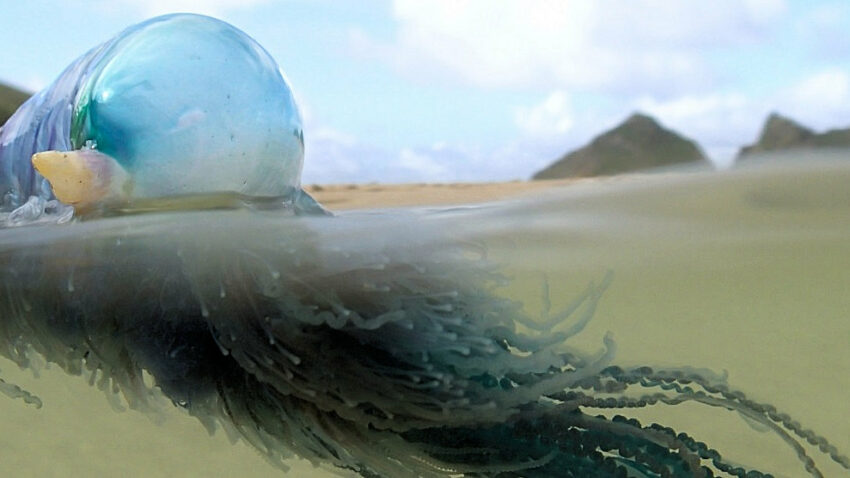Walkers along the Purbeck Coast this winter, especially those with dogs, are being warned to avoid a venonmous sea creature with a nasty sting in its tail.
A number of the Portuguese man o’ war – also called ‘floating terrors’ – have been discovered on beaches at Lulworth Cove and Worbarrow Bay in Dorset on a number of separate days in January 2023.

A Portuguese man o’war discovered on Worbarrow Beach
Venomous Portuguese man o’war spotted
Dorset Wildlife Trust marine centres officer, Sarah Hodgson, spotted some of the jelly-like sea creatures at Worbarrow Beach on Sunday 15th January 2023 when she was out for a walk.
They are normally found in warm areas of the Atlantic Ocean, but 2023 is the third year in the last four that the Portuguese man o’war has been found in Purbeck and it is a strong possibility that more will appear during the winter months.
Dorset Wildlife Trust has advised anyone who finds the unmistakable jellyfish-like creatures while out for a winter walk to give them a wide berth and report them to the trust’s Kimmeridge office.
Dog walkers in particular are asked to keep their eyes peeled for the blue blobs of jelly, as their curious pets may be at risk if they get too close.

Winter dog walkers, these at Shell Bay in Studland, have been asked to take extra care
Fearsome predators with stinging tentacles
A spokesperson for the Dorset Wildlife Trust said:
“These creatures can’t swim and are at the mercy of the winds, which is why they often end up washed ashore after big storms.
“It is becoming a fairly common occurrence to find them on Dorset beaches, especially during winter months after strong south-westerly winds blow them in from the open ocean.
“In the wild they are fearsome predators, catching small fish and crustaceans with their long stinging tentacles. It’s these tentacles that you need to watch out for, as they can sting long after the animal has died.
“We do advise people not to touch a Portuguese man o’war. Their tentacles have strong venom in them and do have a very powerful and painful sting.”

The aptly named Man O’War Bay near Lulworth has also seen the creatures come ashore
Severe pain lasting for several hours
In the most extreme and rare cases documented, the sting can kill a human, but it’s most likely that the only damage done would be a severe burning pain lasting for up to three hours, leaving scars or blisters.
Despite looking like jellyfish, the Portuguese man o’war actually belongs to a group of animals called siphonophores and lives at the surface of the water using their balloon-like floats as a sail to propel them along, with long tentacles trailing underneath to capture prey.
They can be identified by this large translucent purple float, the crest tipped with pink, and by their long blue or violet tentacles, although they lose their colour quickly after becoming stranded and can appear translucent with just a tinge of purple after being ashore for a while.
The Portuguese man o’war is named after the 18th Century armed sailing ship as it is believed they look like one at full sail. They have also been called bluebottles.

One of the Portugese man o’war found on Worbarrow Bay, showing its distinctive gas-filled sail
Further strandings are expected in Dorset
The float – which is filled with gas produced by the animal – is either inclined to the left or to the right, which is believed to be an adaptation of nature so that they catch the wind at different angles and so prevents the whole population being washed up on shore to die.
It is thought that storms which originated north of Bermuda in mid January 2023 could have been responsible for blowing many of the creatures away from their usual hunting grounds, and further strandings are expected along the Dorset coast in the coming days.
In December 2020, Dorset Council had to issue safety warnings about the Portuguese man o’war which was being blown ashore in large numbers and in February 2022 Storm Eunice was said to be responsible for stranding dozens of them on Purbeck beaches.
Further information
- More about the Portugese man o’war is on the Dorset Wildlife Trust website
- Any sightings of the sea creatures ashore can be reported to the trust at: kimmeridge@dorsetwildlifetrust.org.uk





